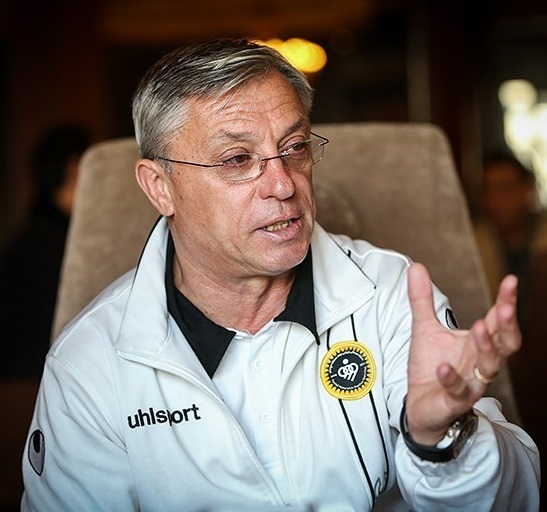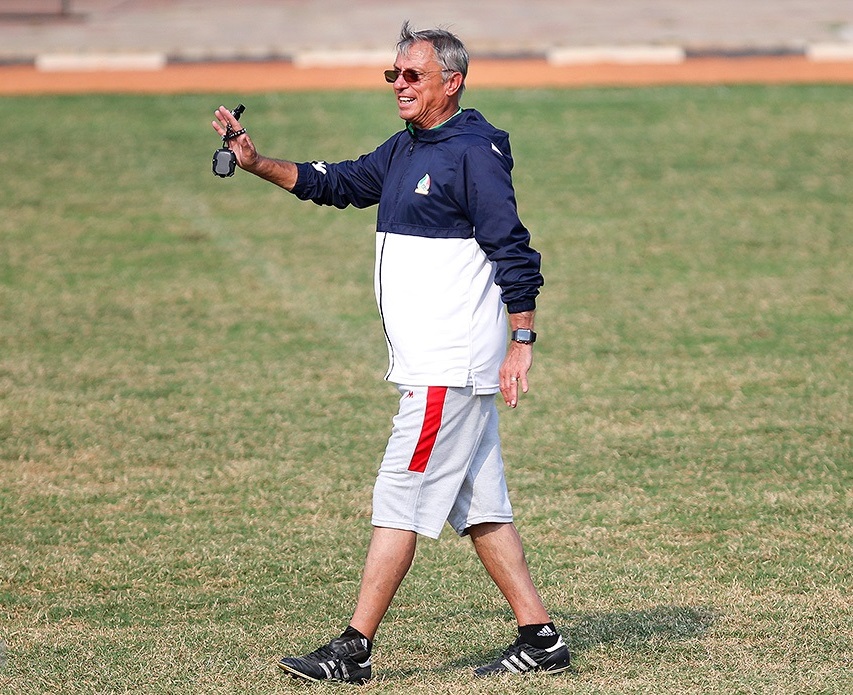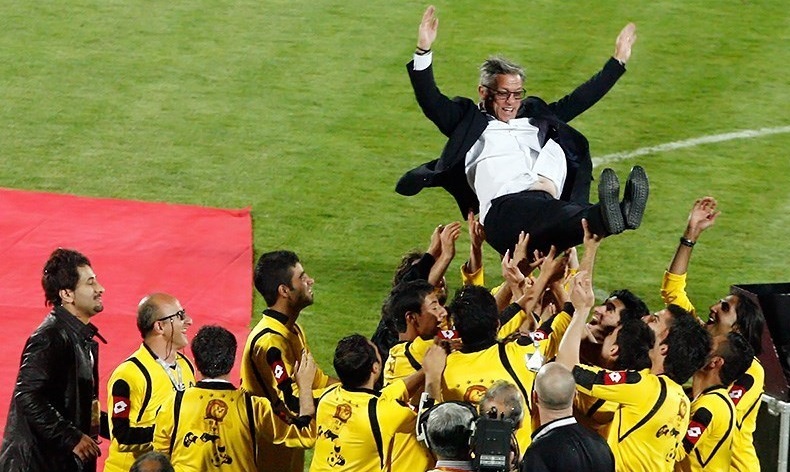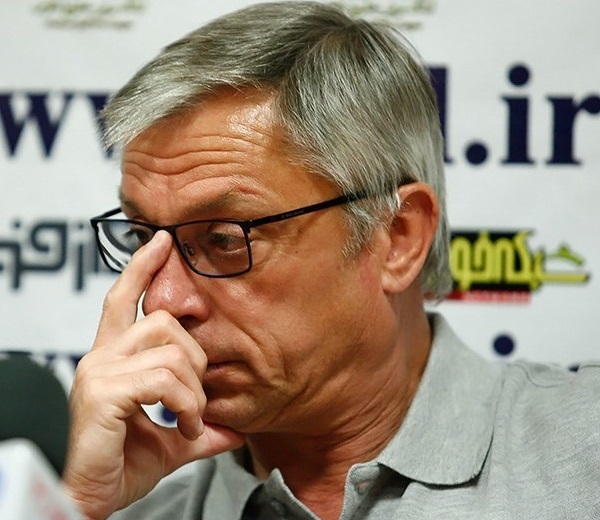1. Overview

Zlatko "Cico" Kranjčar (Zlatko Kranjčarzlâtko tsǐːtso krâɲtʃaːrCroatian) was a prominent Croatian professional football player and manager. Born in Zagreb, he began his illustrious career as a striker for GNK Dinamo Zagreb, where he achieved significant success, including winning the Yugoslav First League and multiple Yugoslav Cups. He later continued his playing career with SK Rapid Wien in Austria, securing several league and cup titles. Kranjčar holds the notable distinction of being the first captain of the independent Croatian national team.
Following his playing career, Kranjčar transitioned into management, coaching numerous clubs across Croatia, Austria, Egypt, Slovenia, the UAE, Slovakia, and Qatar. His managerial highlights include leading GNK Dinamo Zagreb and NK Zagreb to Croatian league and cup victories, and guiding Sepahan to an Iran Pro League title and a Hazfi Cup. He also managed the national teams of Croatia and Montenegro, notably taking Croatia to the 2006 FIFA World Cup. His career was marked by both significant achievements and challenges, including controversies related to player selection and his departure from national team roles.
2. Early Life and Background
Zlatko Kranjčar's early life was deeply intertwined with football, laying the foundation for his future career.
2.1. Childhood and Education
Kranjčar was born on November 15, 1956, in Zagreb, then part of Yugoslavia. He began playing for GNK Dinamo Zagreb at the young age of 10 in 1966, an early start that marked the beginning of his long association with the club. He remained with Dinamo Zagreb throughout his youth development, joining the senior team in 1973.
2.2. Family
In 1983, Zlatko Kranjčar married. He had a son, Niko Kranjčar, who also became a professional footballer and followed in his father's footsteps by playing for the Croatia national team. Zlatko Kranjčar was also fluent in German.
3. Playing Career
Zlatko Kranjčar enjoyed a successful playing career, primarily as a striker and center-forward, making significant contributions to both his club teams and national squads.
3.1. Club Career
Kranjčar started his professional career at GNK Dinamo Zagreb, where he played from 1973 until 1983. He made his first-team debut on March 3, 1974, at the age of 17, in a match against HNK Hajduk Split. He quickly established himself as a popular and prolific striker for the club. During his time with Dinamo, he appeared in a total of 556 matches, including friendlies, and scored 256 goals. Of these, 98 goals were scored in the Yugoslav First League. With Dinamo Zagreb, Kranjčar won the 1981-82 Yugoslav First League, which was the club's first league title in 24 years. He also secured two Yugoslav Cups in 1980 and 1983, and the Yugoslav Youth Football Cup in 1973.
In 1983, he transferred to the Austrian club SK Rapid Wien, where he played until 1990. At Rapid Wien, Kranjčar continued his success, winning the Austrian Bundesliga twice in the 1986-87 and 1987-88 seasons. He also won the Austrian Cup three times (1984, 1985, and 1987) and the Austrian Supercup three times (1986, 1987, and 1988). Notably, he reached the final of the UEFA Cup Winners' Cup in 1985 with Rapid Wien. His last club as a player was VSE St. Pölten, where he played for two months in late 1990, concluding his playing career in 1991.
3.2. International Career
Kranjčar represented both the Yugoslavia and Croatia at the international level.
He made his debut for Yugoslavia in January 1977 in a friendly match against Colombia, entering as a substitute. He earned a total of 11 caps for Yugoslavia, scoring 3 goals. His final international appearance for Yugoslavia was in November 1983 in a friendly against France.
Following Croatia's independence, Kranjčar was capped twice for the Croatia national team, scoring one goal. He is particularly remembered as the first captain of the independent Croatian team, leading them in their inaugural international match against the United States on October 17, 1990, in Zagreb. Both of these matches for Croatia were considered unofficial, as Croatia was still formally part of Yugoslavia at the time. He retired from playing in 1993.
4. Managerial Career
Zlatko Kranjčar transitioned into a managerial role after his playing career, leading numerous clubs and national teams across different countries. His coaching philosophy emphasized team leadership and achieving significant accomplishments, though his tenure was sometimes marked by short spells and controversies.
4.1. Early Management
Kranjčar began his coaching career in 1991 as an advisor at Austria Klagenfurt. From 1992 to 1994, he coached the Croatian club Segesta. In 1994, he moved to Croatia Zagreb, where he achieved immediate success, winning the Croatian Championship and Cup in his first season. In 1996, he returned to Austria to coach FC Linz. A year later, he was back in Croatia, coaching Slaven Belupo, Segesta (for a second spell), and Samobor. In 1998, he returned to Croatia Zagreb, leading the club to another Croatian Championship and Cup double, as well as an appearance in the UEFA Champions League.
In 1999, Kranjčar took on a new challenge, coaching the Egyptian club Al-Masry, followed by a one-season spell at the Slovenian club NK Mura in 2000. He also managed NK Marsonia from 2000 to 2001. In 2002, he achieved another Croatian championship title with NK Zagreb. He later managed HNK Rijeka from 2002 to 2003 and had a second stint with NK Zagreb from 2003 to 2004. In 2007, he briefly managed NK Croatia Sesvete in the Croatian second division, leading them to promotion to the first division, but resigned due to a dispute with the club's board over player salaries. He then took over Al-Shaab in the United Arab Emirates in June 2007 but was sacked in December after a disagreement regarding player selection. On April 22, 2009, he was appointed head coach of DAC 1904 Dunajská Streda in Slovakia.
4.2. National Team Management
Kranjčar notably led two national teams during his managerial career: Croatia and Montenegro.
After the Croatia failed to advance past the group stage at UEFA Euro 2004, Kranjčar was chosen to succeed Otto Barić as the national team's coach in July 2004. He managed Croatia in 25 international matches between August 2004 and June 2006. Under his guidance, the team topped their group in the 2006 FIFA World Cup qualifying campaign, remaining undefeated with seven wins and three draws in ten matches. However, at the 2006 FIFA World Cup finals in Germany, Croatia failed to progress beyond the group stage, recording one loss and two draws in their three matches. Following this performance, the Croatian Football Federation decided not to renew Kranjčar's contract, which expired on July 14, 2006. His decision to consistently field his son, Niko Kranjčar, even when his form was questionable, drew significant criticism in Croatia.
In February 2010, Kranjčar took over the Montenegro national team from Zoran Filipović. His tenure began poorly with two defeats in friendly matches against Macedonia and Albania, followed by a third defeat against Norway. He was dismissed on September 8, 2011, shortly after Montenegro's defeat to Wales in a UEFA Euro 2012 qualifier. The Montenegrin Football Federation cited alcohol addiction as the reason for his dismissal.
4.3. Club Management
Kranjčar had several significant spells managing clubs, particularly in Iran.
On July 1, 2009, he was appointed head coach of Iran Pro League side Persepolis, signing a two-year contract. Despite having talented players, Persepolis struggled in the initial weeks of the 2009-10 Persian Gulf Cup season. He was briefly sacked by the club chairman Habib Kashani on September 25, 2009, after a loss against Paykan, but was reinstated five days later following support from the technical committee. His contract was renewed until the end of the half-season, and he was eventually replaced by Ali Daei on December 28, 2009, after his contract expired.
Kranjčar signed a two-year contract with Iran Pro League three-time champion, Sepahan, on October 28, 2011, replacing his compatriot Luka Bonačić. In his first match, Sepahan drew 0-0 with his former club, Persepolis. On May 11, 2012, Sepahan clinched their fourth league title, and first under Kranjčar, with a draw against Mes Sarcheshmeh. They also reached the Quarter-finals of the AFC Champions League. In the 2012-13 Hazfi Cup, his side defeated Persepolis 4-2 on penalties in the final, securing their fourth domestic cup title in ten years. In his second season with Sepahan, the team finished third in the league, three points behind the eventual winner, Esteghlal. On September 8, 2014, Kranjčar resigned as Sepahan manager for an undisclosed reason and was replaced by Hossein Faraki.
On February 7, 2015, Kranjčar was named the new manager of Doha-based club Al-Ahli, signing a two-year contract. However, he was sacked in February 2016 after a series of poor results.
On March 17, 2017, Kranjčar returned to Sepahan, signing another two-year contract. However, after a period of unfavorable results, he parted ways with the club by mutual consent on January 20, 2018.
Kranjčar also had a brief return to GNK Dinamo Zagreb as manager on June 23, 2016, succeeding Zoran Mamić. However, he resigned in September 2016 due to the team's poor performance.
4.4. Youth and Other National Team Management
In addition to his senior club and national team roles, Zlatko Kranjčar also contributed to youth football development. On April 29, 2018, he became the head coach of the Iran national under-23 team, signing a contract until 2020. He had also previously managed the Iran U-23 team in 2014.

5. Personal Life
Zlatko Kranjčar was married in 1983. His son, Niko Kranjčar, followed in his footsteps to become a professional footballer, also representing the Croatia national team. Kranjčar was known to be fluent in German. He was approximately 70 in (179 cm) tall.
6. Death
Zlatko Kranjčar died on March 1, 2021, at the age of 64. His passing followed a short but severe illness. His health condition deteriorated in Zadar, where he was hospitalized. He was subsequently transferred urgently to Zagreb, but medical professionals were unable to save his life.
7. Statistics
This section provides comprehensive statistical data for Zlatko Kranjčar's career as both a player and a manager.
7.1. Player Statistics
| Club | Season | League | Cup | Europe | Other | Total | ||||||
|---|---|---|---|---|---|---|---|---|---|---|---|---|
| Division | Apps | Goals | Apps | Goals | Apps | Goals | Apps | Goals | Apps | Goals | ||
| Dinamo Zagreb | 1973-74 | Yugoslav First League | 12 | 2 | 0 | 0 | - | - | 12 | 2 | ||
| 1974-75 | 30 | 8 | 3 | 0 | - | - | 33 | 8 | ||||
| 1975-76 | 31 | 6 | 5 | 3 | - | - | 36 | 9 | ||||
| 1976-77 | 32 | 9 | 1 | 0 | 10 | 6 | - | 43 | 15 | |||
| 1977-78 | 18 | 9 | 2 | 0 | - | - | 20 | 9 | ||||
| 1978-79 | 26 | 13 | 0 | 0 | - | - | 26 | 13 | ||||
| 1979-80 | 32 | 14 | 6 | 5 | 2 | 0 | - | 40 | 19 | |||
| 1980-81 | 17 | 5 | 2 | 0 | 2 | 0 | - | 21 | 5 | |||
| 1981-82 | 17 | 12 | 3 | 2 | 0 | 0 | - | 20 | 14 | |||
| 1982-83 | 29 | 13 | 4 | 9 | 2 | 0 | - | 35 | 22 | |||
| 1983-84 | 17 | 7 | 2 | 0 | 2 | 2 | - | 21 | 9 | |||
| Total | 261 | 98 | 28 | 19 | 18 | 8 | 0 | 0 | 307 | 125 | ||
| Rapid Wien | 1983-84 | Austrian Bundesliga | 13 | 6 | 6 | 2 | 2 | 1 | - | 21 | 9 | |
| 1984-85 | 30 | 17 | 7 | 3 | 9 | 1 | - | 46 | 21 | |||
| 1985-86 | 34 | 23 | 5 | 2 | 6 | 1 | - | 45 | 26 | |||
| 1986-87 | 28 | 18 | 7 | 1 | 3 | 2 | 1 | 1 | 39 | 22 | ||
| 1987-88 | 31 | 17 | 2 | 0 | 4 | 3 | 1 | 0 | 38 | 20 | ||
| 1988-89 | 33 | 17 | 1 | 3 | 2 | 1 | 1 | 0 | 37 | 21 | ||
| 1989-90 | 27 | 8 | 4 | 3 | 6 | 2 | - | 37 | 13 | |||
| 1990-91 | 5 | 0 | 1 | 0 | 0 | 0 | - | 6 | 0 | |||
| Total | 201 | 106 | 33 | 14 | 32 | 11 | 3 | 1 | 269 | 132 | ||
| Pölten | 1990-91 | Austrian Bundesliga | 12 | 2 | - | - | - | 12 | 2 | |||
| Career total | 467 | 204 | 62 | 33 | 50 | 19 | 3 | 1 | 582 | 257 | ||
Appearances and goals by national team and year
| National team | Year | Apps | Goals |
|---|---|---|---|
| Yugoslavia | 1977 | 2 | 0 |
| 1978 | 1 | 0 | |
| 1979 | 1 | 2 | |
| 1980 | 1 | 0 | |
| 1981 | 0 | 0 | |
| 1982 | 1 | 1 | |
| 1983 | 5 | 0 | |
| Total | 11 | 3 | |
| Croatia | 1990 | 2 | 1 |
| Total | 2 | 1 | |
International goals
Scores and results list Yugoslavia's and Croatia's goal tally first.
| No. | Date | Venue | Cap | Opponent | Score | Result | Competition |
|---|---|---|---|---|---|---|---|
| Yugoslavia goals | |||||||
| 1 | November 14, 1979 | Gradski stadion, Novi Sad, Yugoslavia | 4 | Cyprus | 1-0 | 5-0 | UEFA Euro 1980 qualifying |
| 2 | 2-0 | ||||||
| 3 | December 15, 1982 | Gradski stadion, Titograd, Yugoslavia | 6 | Wales | 3-1 | 4-4 | UEFA Euro 1984 qualifying |
| Croatia goals | |||||||
| 1 | December 22, 1990 | Stadion Kantrida, Rijeka, Yugoslavia | 2 | Romania | 1-0 | 2-0 | Friendly |
7.2. Managerial Statistics
| Team | From | To | Record | |||||||
|---|---|---|---|---|---|---|---|---|---|---|
| G | W | D | L | GF | GA | +/- | Win % | |||
| Segesta | July 1992 | May 1994 | 64 | 22 | 15 | 27 | 79 | 88 | -9 | 34.38 |
| Croatia Zagreb | October 27, 1994 | June 5, 1996 | 70 | 48 | 12 | 10 | 170 | 59 | +111 | 68.57 |
| Samobor | May 1997 | January 1998 | 10 | 9 | 1 | 0 | 26 | 8 | +18 | 90.00 |
| Croatia Zagreb | February 16, 1998 | October 24, 1998 | 35 | 23 | 7 | 5 | 73 | 31 | +42 | 65.71 |
| El-Masry | February 1999 | August 2000 | 30 | 20 | 5 | 5 | 44 | 10 | +34 | 66.67 |
| Marsonia | November 2000 | March 2001 | 9 | 3 | 2 | 4 | 17 | 18 | -1 | 33.33 |
| Zagreb | April 2001 | May 2002 | 41 | 21 | 9 | 11 | 83 | 49 | +34 | 51.22 |
| Rijeka | June 2002 | December 2002 | 22 | 5 | 3 | 14 | 23 | 33 | -10 | 22.73 |
| Zagreb | June 2003 | February 2004 | 12 | 3 | 3 | 6 | 11 | 15 | -4 | 25.00 |
| Croatia | July 2004 | August 2006 | 25 | 11 | 8 | 6 | 29 | 15 | +14 | 44.00 |
| Persepolis | July 2009 | December 2009 | 21 | 8 | 9 | 4 | 31 | 24 | +7 | 38.10 |
| Montenegro | February 2010 | September 2011 | 12 | 6 | 2 | 4 | 14 | 11 | +3 | 50.00 |
| Sepahan | October 2011 | September 2014 | 120 | 62 | 34 | 24 | 181 | 108 | +73 | 51.67 |
| Al-Ahli | February 2015 | February 2016 | 36 | 17 | 11 | 8 | 55 | 37 | +18 | 47.22 |
| Dinamo Zagreb | July 2016 | September 2016 | 16 | 11 | 2 | 3 | 28 | 18 | +10 | 68.75 |
| Sepahan | March 2017 | January 2018 | 27 | 8 | 9 | 10 | 30 | 29 | +1 | 29.63 |
| Iran U23 | April 2018 | May 2019 | 18 | 9 | 3 | 6 | 30 | 18 | +12 | 50.00 |
| Total | 568 | 286 | 135 | 147 | 924 | 571 | +353 | 50.35 | ||
8. Honours
Zlatko Kranjčar achieved numerous honours throughout his career as both a player and a manager, winning multiple league titles and cups.
8.1. Player Honours
Dinamo Zagreb
- Yugoslav First League: 1981-82
- Yugoslav Cup: 1980, 1983
- Yugoslav Youth Football Cup: 1973
Rapid Wien
- Austrian Bundesliga: 1986-87, 1987-88
- Austrian Cup: 1984, 1985, 1987
- Austrian Supercup: 1986, 1987, 1988
Yugoslavia U-21
- UEFA European Under-21 Championship: 1978
8.2. Managerial Honours
Dinamo Zagreb
- Croatian First League: 1995-96, 1997-98
- Croatian Cup: 1996, 1998
NK Zagreb
- Croatian First League: 2001-02
Sepahan
- Iran Pro League: 2011-12
- Hazfi Cup: 2012-13


8.3. Individual Honours
- Franjo Bučar State Award for Sport: 2005
- Iranian Manager of the Year: 2012
- Iran Football Federation Award Coach of the Season: 2012-13
- Dinamo Zagreb all-time XI
9. Assessment and Legacy
Zlatko Kranjčar's career in football, spanning decades as both a player and a manager, left a significant mark on Croatian and international football. As a player, he was a prolific striker and a beloved figure at GNK Dinamo Zagreb, leading the club to its first league title in nearly a quarter-century. His role as the first captain of the independent Croatian national team cemented his place in the nation's football history, symbolizing a new era for Croatian sport.
As a manager, Kranjčar was known for his ability to achieve domestic success, securing league and cup titles with multiple clubs, including Dinamo Zagreb, NK Zagreb, and Sepahan. His coaching style, while often leading to silverware, also faced scrutiny, particularly during his tenure as Croatia national team coach. The decision to consistently select his son, Niko Kranjčar, for the national squad, even when the player's form was in question, generated considerable debate and criticism within Croatia. This instance highlighted a challenge in balancing personal relationships with professional responsibilities in high-stakes environments.
Furthermore, his dismissal from the Montenegro national team due to alleged alcohol addiction presented a personal challenge that became public, affecting his professional standing. Despite these controversies, Kranjčar's overall impact on the sport, especially in developing Croatian football and achieving success in various leagues, remains a key part of his legacy. He was a figure who navigated the complexities of professional football with both triumphs and personal struggles, leaving behind a record of notable achievements and a complex public image.